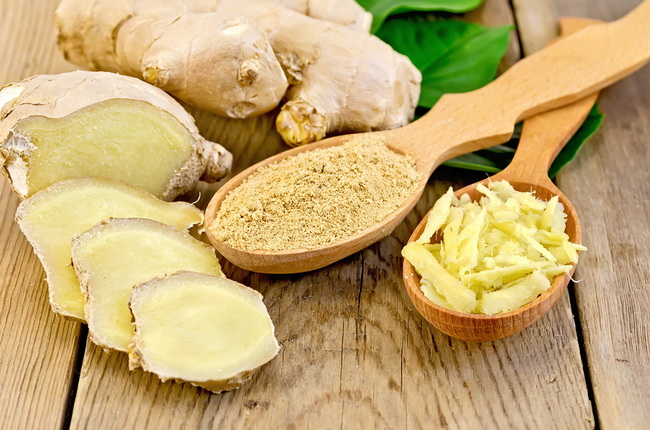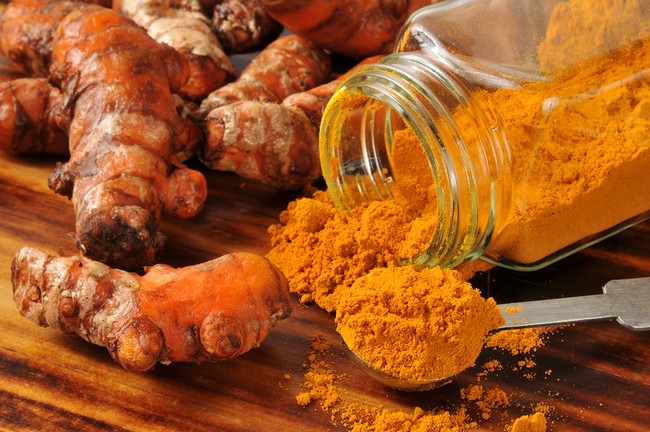- Make It Yourself Lavender Heart-Shaped Bath Bombs!
- 20 Things You Never Knew About “Down There”
- 12 Best Foods For Those Suffering From Arthritis Pain
- 12 Personal Hygiene Mistakes Almost Everyone Makes (Mom Never Told You About #4!)
- 15 Medicinal Plants And Herbs From The Cherokee People
- 12 Mind-Blowing Benefits Of Drinking Coconut Water During Pregnancy
- 12 Outstanding Winter Foods That Won’t Fatten You Up Like A Christmas Turkey
Top 12 Herbs for Relief of Joint Pain

Photo credit: bigstock.com
If you have ever had any type of joint pain in your lifetime, you know that it’s no joke. Pain in the joints can be a debilitating condition. It sometimes occurs due to overuse such as playing sports or after years spent typing, or it can be related to an autoimmune disease, which attacks the joints or the surrounding tissue, however, joint pain is most often associated with aging.
Regardless of the root cause, if you have tried traditional medications and didn’t get the results you were looking for, or if you want to try a more natural approach, there are several herbal remedies that have the potential to address the root cause as well as stop the painful symptoms. Keep reading for the top 12 herbs that are well known for helping to manage joint pain.
1. Burdock Root
This little known herb works wonders for those with joint pain. It contains natural pain relievers, antioxidants, as well as anti-inflammatories that help reduce inflammation and stop the pain that comes with arthritis and other degenerative joint diseases. Burdock root has been shown in studies to help stop the discomfort of arthritis such as the swelling, stiffening, tenderness, and pain when moving. In fact, research shows that increasing consumption of foods and supplements that are rich in essential fatty acids, such as fatty fish and avocados, can greatly help with joint pain. Burdock root has high sterol and tannin compounds, but it also is high in these essential fatty acids. This might be one reason why burdock root works so well.
2. Flax Seed Oil
Flax has been widely cultivated for more than 7,000 years for its powerful healing capabilities. This plant has strong omega-3 ALA content, which is known to fight inflammation. Omega-3 fatty acids limit inflammatory reactions in the body that are caused by gout and joint pain. Consumption of flax seed oil has been proven to be effective in lessening the intensity of the sudden pain and swelling of the joints that sometimes occurs.
3. Licorice
One of the most popular herbs for joint pain is licorice. Licorice is effective because it imitates the activities of the body’s natural production of corticosteroids that help stop inflammation. Licorice also works by killing free radicals on the affected sites as well as stopping the production of enzymes that cause inflammation. Licorice works well whether you decide to consume it as a supplement or as a tea. Read also how to use licorice for tooth decay treatment.
4. Cat’s Claw
This herb is a terrific anti-inflammatory that also helps reduce the swelling that often accompanies arthritis. The use of cat’s claw goes back to the ancient Inca civilization. Cat’s claw has also been used traditionally to improve the immune system and, in recent years, the powers of immunity have been tested for those suffering with arthritis. The University of Maryland Medical Center states that, in the correct amount, cat’s claw can help with osteoarthritis pain and swelling, but they caution about taking too much as it can actually overstimulate the immune system, making arthritis pain worse.
Continue to Page 2

Photo credit: bigstock.com
5. Ginger
You might only think of ginger as something to stop nausea, but research shows that it is also very effective at fighting arthritis. The active ingredient in this plant, gingerols, has powerful anti-inflammatory compounds. Ginger stops joint pain by preventing the formation of cytokine, a chemical that triggers inflammation. In fact, in one study that covered a 3 year period, it was found that 75 percent of the subjects who had rheumatoid arthritis had significant improvements in pain and swelling after consuming ginger supplements. You can make your own fresh tea from organic ginger root, or take capsules which contain powdered ginger.
6. Cayenne
Cayenne pepper, that spicy stuff that makes foods taste so yummy, is loaded with a pain killing compound called capsaicin. It’s an interesting mechanism. Capsaicin creates a mild irritation to the nerves, which distracts them from more intense joint pain. Repeated application of creams that contain capsaicin is well-known for significantly reducing joint pain. Due to cayenne’s anti-inflammatory compounds, it’s also thought to ease gout and digestive related pain, such as ulcers.
7. Boswellia
This tree originates in India and is loaded with analgesic, anti-arthritic, and anti-inflammatory compounds. One randomized study in 2003 evaluated the efficiency, tolerability, and safety of Boswellia extract in 15 subjects who had osteoarthritis in their knees. The researchers concluded that this herb decreased pain and the frequency of swelling, improved the ability to walk, and increased knee flexibility after only 8 weeks of use. Boswellia is also thought to prevent the invasion of inflammatory white blood cells into damaged tissue, which makes it a natural pain killer.
8. Stinging Nettle
Although the name sounds like something you would want to avoid, once you infuse this herb in hot water the rash that you would normally get from touching the plant will be neutralized. You can always buy premade tea bags at any health food store if you worry about touching the plant itself. Stinging nettle tea is often used to alleviate the pain that is linked to joint pain and gout. Studies have found that singing nettle is a safe and inexpensive method for treating joint pain.
Continue to Page 3

Photo credit: bigstock.com
9. Turmeric
Turmeric is a powerful herb that is best known for its anti-inflammatory compounds and can help with a wide range of health conditions. Turmeric is an excellent pain reliever that works well due to the curcumin and curcumoinoids that reduce inflammation in the body. The University of Arizona conducted a study and found that consuming turmeric was super effective in helping lower inflammation levels. Turmeric reduced swelling as well. This herb works by blocking the production of protein on genes that tell the blood vessels to swell.
This spice has long been used to help those who are suffering from joint pain and achy joints. A study published in 2009 in The Journal of Alternative and Complementary Medicine compared the effects of turmeric to ibuprofen in 107 subjects who had arthritis of the knee. The results were astounding and showed that the active ingredient in turmeric, curcumin, was just as effective as ibuprofen in alleviating pain and improving knee flexibility.
10. Eucalyptus
Eucalyptus can be found as supplements or in topical oil extracts. The leaves are used to treat arthritis pain. The leaves of the eucalyptus plant contain tannins, which help reduce pain and swelling in arthritic joints. Some users follow up with heat pads that maximize the effects of eucalyptus. You can also use the essential oil by adding it to a carrier oil and rubbing it directly on the joints. Read more about benefits of eucalyptus oil.
11. Feverfew
Although this sounds like something you would take for a fever, feverfew is excellent for relieving joint pain. Research has proven that this herb stops inflammation in body tissues and the joints, which is the major cause of pain. Compounds in feverfew inhibit the release of serotonin, histamine, and other inflammatory substances that trigger the spam of blood vessels. Feverfew works like aspirin to reduce the intensity of pain and reducing inflammation.
BE AWARE: Drugs that Relieve Joint Pain are Silently Killing You
12. Arnica
This is a very popular herb for good reason. When applied as a cream or balm, arnica has been shown to work as a natural pain reliever. It also helps to lessen stiffness in joints. Arnica has been proven in studies to work just as well as ibuprofen to relive pain and function in subjects that had osteoarthritis in the hand. This study suggests that arnica can work as well as ibuprofen yet has none of the side effects associated with this over the counter pain reliever.
Sources:
































